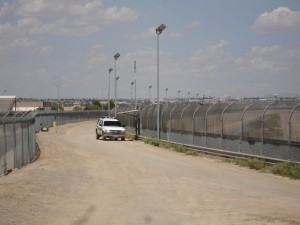 The long-awaited bipartisan Senate immigration reform bill was finally unveiled last week. The 844-page bill, sponsored by Senators Schumer (D-NY), McCain (R-AZ), Menendez (D-NJ), Rubio (R-FL), Durbin (D-IL), Graham (R-SC), Bennet (D-CO), and Flake (R-AZ), is known as the “Border Security, Economic Opportunity, and Immigration Modernization Act of 2013.” The focus of the bill’s first section (Title I) is border security and the implementation of further goals, such as the path to citizenship for those currently in the country illegally, depends on reaching border enforcement milestones.
The long-awaited bipartisan Senate immigration reform bill was finally unveiled last week. The 844-page bill, sponsored by Senators Schumer (D-NY), McCain (R-AZ), Menendez (D-NJ), Rubio (R-FL), Durbin (D-IL), Graham (R-SC), Bennet (D-CO), and Flake (R-AZ), is known as the “Border Security, Economic Opportunity, and Immigration Modernization Act of 2013.” The focus of the bill’s first section (Title I) is border security and the implementation of further goals, such as the path to citizenship for those currently in the country illegally, depends on reaching border enforcement milestones.
According to Immigration and Customs Enforcement (ICE), deportations of immigrants who were living in the country illegally have increased over the last five years. However, this fact is known by only 28% of Americans, according to PRRI’s recent survey, while 18% think the number has decreased and 42% think that it has remained the same.
Americans’ perceptions of deportations influence their support for a path to citizenship for immigrants currently living in the country illegally. While 63% of all Americans favor a path to citizenship for those living in the country illegally, 7-in-10 (70%) Americans who think that deportations have increased over the last five or six years favor a path to citizenship. By contrast, American who believe that deportations have decreased are much less likely to express support for a path to citizenship (49%) and exhibit greater support for identifying and deporting immigrants currently living in the country illegally than those who think that deportation have increased (35% vs. 13%).
This perception is particularly important if the bill is to gain widespread support among both Democratic and Republican lawmakers. While nearly half (45%) of Republicans who think deportations have decreased favor a path to citizenship, a majority of those who think that deportations have increased (53%) or stayed the same (55%) support a path to citizenship.
Although the final bill will certainly undergo some significant changes during the legislative process, it is safe to assume that border security and enforcement will be major components, for they constitute the glue that will hold a bipartisan agreement together.
Photo courtesy of Wikimedia Commons.




